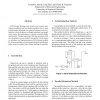7 search results - page 1 / 2 » High-Performance FPGA-Based General Reduction Methods |
FCCM
2005
IEEE
13 years 10 months ago
2005
IEEE
FPGA-based floating-point kernels must exploit algorithmic parallelism and use deeply pipelined cores to gain a performance advantage over general-purpose processors. Inability t...
CCGRID
2007
IEEE
13 years 10 months ago
2007
IEEE
The performance of MPI collective operations, such as broadcast and reduction, is heavily affected by network topologies, especially in grid environments. Many techniques to cons...
TPDS
2010
13 years 2 months ago
2010
The objective of this paper is to extend, in the context of multicore architectures, the concepts of tile algorithms [Buttari et al., 2007] for Cholesky, LU, QR factorizations to t...
SBCCI
2005
ACM
13 years 10 months ago
2005
ACM
Gate oxide tunneling current Igate and sub-threshold current Isub dominate the leakage of designs. The latter depends on threshold voltage Vth while Igate vary with the thickness ...
DAC
2010
ACM
13 years 2 months ago
2010
ACM
Clock meshes are extremely effective at filtering clock skew from environmental and process variations. For this reason, clock meshes are used in most high performance designs. Ho...

